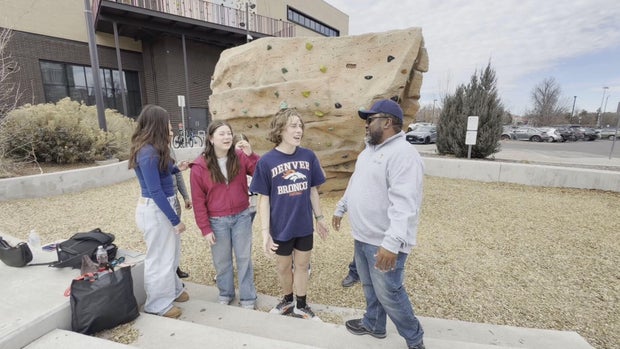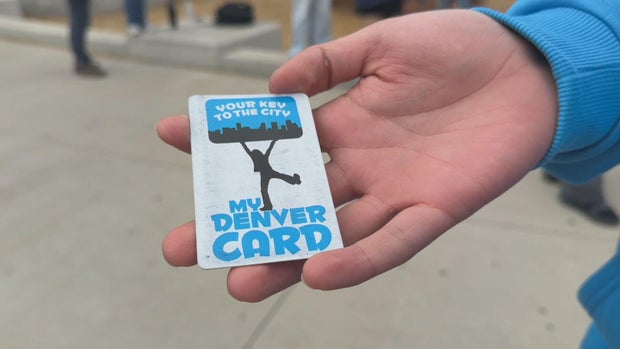Press play for a time machine into Colorado’s last real chance to host the Olympics.
The Denver Chamber of Commerce produced a 14-minute promotional video for hosting the 1976 Winter Games. It opens with grainy aerial views of the Rocky Mountains, cowboys on horseback, a Native American ceremony, skiers busting through powder, a cheesy soundtrack and a booming voice:
The Denver Olympic story starts in a land of Olympian proportions. The American West.
The pitch worked. In 1970, the International Olympic Committee (IOC) awarded Denver the ‘76 Winter Games on promises made in their application. The video continues:
Already, nearly 80 percent of the facilities necessary to hold the ‘76 games are constructed and ready. … The proposed site for the men’s and women’s slalom, and giant slalom, at Loveland Basin is only 45 minutes from downtown Denver by superhighway. … Nordic events will be held in the Evergreen area. … Figure skating and ice hockey events can be held at the Denver Coliseum. … Speed skating will take place at a new rink near the Olympic village. … We hope we’ll see you in ‘76.
Of course, none of that happened.
Colorado voters in 1972 overwhelmingly approved Amendment 8, a grassroots effort prohibiting the state from levying taxes or allocating funds for the ’76 Winter Games. They went to Innsbruck, Austria, instead. It marked the first time in Olympic history that a selected host site boycotted.
“It’s really rare that a city would invest this kind of capital and then not ensure that its voters are lined up behind it,” said Samuel Bock, a public historian and exhibit developer for History Colorado. “But I think it’s important to understand the gulf in terms of the optimism of the people promoting the bid and the actual reality on the ground.”
Has anything changed in 50-plus years?
The Denver Gazette sought to understand why Colorado rejected the ‘76 Winter Games — and determine if the state is ready for another push to host — ahead of the upcoming Paris Olympics.
Matthew Payne, executive director of the Denver Sports Commission, is ready for that conversation.
“Visit Denver and the Denver Sports Commission would be thrilled to evaluate and, if appropriate, support a future Olympic bid if the state and city residents supported it,” Payne said in a statement to The Denver Gazette.
—
Call it a second gold rush. The 1960s were transformational in Colorado mountain towns.
Ski resorts opened in Breckenridge, Steamboat Springs and Vail, coinciding with massive population booms across the Front Range. It’s no surprise industry leaders and local politicians sought to share their mountains and grow business opportunities on the Olympic stage.
It began in 1963, according to the Denver Public Library, when Gov. John Love mentioned the possibility during a speech delivered in Colorado Springs. Momentum grew in 1967 when the U.S. Olympic Committee picked Denver as its official candidate for the ‘76 Winter Games. In 1968, the Denver Organizing Committee (DOC) traveled to the Olympics in France and Mexico City to help bolster the city’s candidacy.
Yet the DOC failed to predict an undercurrent of public skepticism back home.
Richard Lamm, a state representative in the early 1970s, was not convinced a Colorado Olympics were a good idea. He organized the Olympic opposition effort — Citizens for Colorado’s Future — for collecting signatures to include Amendment 8 on the ballot.
As it turned out, major roadblocks existed between Denver and the ‘76 Winter Games.
The city oversold its hosting ability and undersold the financial commitment.
• Having “nearly 80 percent” of all required venues constructed was overstated. Denver and its adjacent mountain communities lacked an Olympic ski jump, luge and bobsled tracks, a speedskating facility, media housing and a modernized downtown arena.
• The IOC required all venues be within 50 miles of the Athletes’ Village in Denver, eliminating Breckenridge, Steamboat Springs and Vail. Alternative locations at Mount Sniktau and Evergreen did not receive much snow. Proposed solutions? Helicopter travel for Alpine athletes or trucking in snow to lower-elevation events.
• The DOC initially proposed a price tag of $15 million to host the Winter Games. Their estimate later grew to $35 million. But the final number would likely be much higher. A fitting example: The 1976 Summer Games left the city of Montreal with more than $1 billion in debt, according to The Guardian.
Lamm later served three terms as Colorado Governor (1975-87). He died in 2021 due to complications from a pulmonary embolism. He was 85.
“I was on the legislative audit committee back in the 1970s,” Lamm told Colorado Politics in 2019. “And that’s when I started evaluating the pros and cons of the Olympics. We fought it back in those days in 1972. The voters made a decision, and I was convinced it was the right one.”
Lessons from the 1976 boycott remain as conversation shifts to the present day.
Colorado Springs is home to the U.S. Olympic and Paralympic Training Center. Denver missed out as a host city for the 2026 World Cup. But it successfully held large-scale events like the 2008 Democratic National Convention and MLB, NHL, NBA all-star games.
But is the state ready to host a Winter Games?
—
Time for a reality check. The Olympics will not be held in Colorado, at the very earliest, until the 2040s.
The 2026 Winter Games are in Italy. It’s anticipated in 2030 the French Alps will host. Salt Lake City is the leading candidate for 2034.
Denver’s exclusion is not from a lack of effort.
In 2018, the city formed the Olympic & Paralympic Winter Games Exploratory Committee to “determine if hosting a future Olympic and Paralympic Winter Games could be done and should be done” for a potential 2030 bid.
Their conclusion: Yes. But with conditions.
The committee recommended the Olympics be privately financed, designed to prioritize existing or temporary venues instead of new construction, while being sensitive to traffic congestion and affordable housing. It should also be voted on by residents through a statewide initiative.
Their proposal, while innovative, ultimately didn’t sell. The United States Olympic Committee chose to nominate Salt Lake City over Denver for the Winter Games. Utah benefits from existing venues and facilities after the 2002 Winter Games in Salt Lake. Denver reimagined how the Olympics should operate.
It’s unclear when Colorado will re-enter the Olympics conversation. In 2019, Denver residents passed Initiative 302 to require a vote before the city spends public money on any future bid.
“The possibility of the Olympics being hosted in Colorado is a larger discussion that would require careful consideration from stakeholders across the state,” Colorado Springs mayor Yemi Mobolade told The Denver Gazette in a statement. “In the meantime, we will continue to champion the Olympic and Paralympic spirit and ideals as we showcase our city’s commitment to the movement and support for Team USA athletes.”
Colorado’s rejection of the ‘76 Winter Games shaped its trajectory for decades to come. The grainy Denver Chamber of Commerce promotional video is a glimpse into an unfulfilled vision of growth for the state. But at what real cost?
“The historian in me takes a look at the last 20 or 30 years and thinks: Who knows what would have happened if we had brought the Olympics here? We may not have really needed to,” Bock said. “It didn’t seem to be a bump in the road for anything. Because the state’s growth has been just meteoric.”
















































